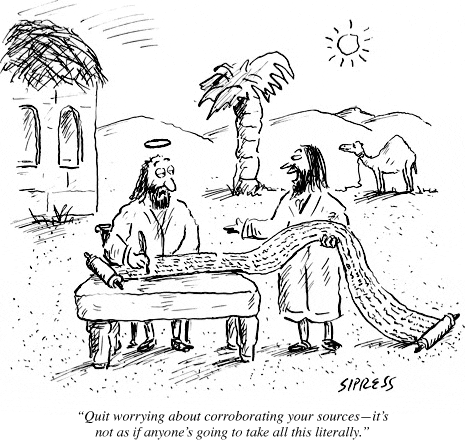
Evangelicals often confuse evidence with claims. When pressed on this or that belief, Evangelicals often respond by saying “the Bible says.” However, the Bible is a book of claims, not evidence. When skeptics ask for evidence for a particular assertion, Evangelicals often quote Bible verses, thinking that, in doing so, they have provided evidence for their claims. They have done no such thing.
Here is some of the claims Evangelicals make;
- The Bible is the very words of God
- The Bible is without error
- The Bible is infallible
- God is a triune being
- Jesus is the eternal Son of God
- Jesus was born of a virgin
- Jesus worked miracles, including raising the dead and turning water into wine.
- Jesus resurrected from the dead
- Jesus ascended to Heaven
- Christianity is true, and all other religions are false
All of these statements are claims, not evidence. Just because Evangelicals can “prove” their assertions with prooftexts, this is not the same as supporting a claim with evidence. Certainly, the Bible can be used as a historical source when warranted, but what the Bible says alone is not sufficient to justify Evangelical claims. Just because the Bible says Jesus was born of a virgin doesn’t mean he was. The same goes for every claim made with prooftexts. For skeptics, words from a book are not sufficient evidence for supernatural claims. If I said Harry Potter is a real person and he can fly, people would rightly ask me for evidence for my claim. If I said, Harry Potter and the Prisoner of Azkaban proves Harry is a real person and he can fly, would you believe me? Of course not. So it is with supernatural claims. Unfortunately, many Evangelicals confuse claims with evidence. If Evangelical apologists can’t provide sufficient evidence for their claims, there’s no reason to listen to them.
I am sure some Evangelical commenters will appeal to faith as justification for their claims. That’s fine, but faith will not fly with me and many of the readers of this blog. Faith is the last refuge for believers. It is a safe place where reason, rationality, and evidence are optional. It is the last refuge for believers hiding from the evil philosophies of the world. With faith, anything is possible.
Bruce Gerencser, 68, lives in rural Northwest Ohio with his wife of 47 years. He and his wife have six grown children and sixteen grandchildren. Bruce pastored Evangelical churches for twenty-five years in Ohio, Texas, and Michigan. Bruce left the ministry in 2005, and in 2008 he left Christianity. Bruce is now a humanist and an atheist.
Your comments are welcome and appreciated. All first-time comments are moderated. Please read the commenting rules before commenting.
You can email Bruce via the Contact Form.

It’s not just that the bible can’t be used as evidence for its own validity, it’s that the whole apologist case is based on the false premise that our mere existence is proof that there must be a god. I’ve seen, admittedly pretty low grade, religionists argue “well if god doesn’t exist then how do you explain our existence?”, as though the matter is self evident. It isn’t. The idea that we were created by a god is, at best, a hypothesis, though it fails even in this in that it is not in any way testable. Of course, now we have apologists scrambling to try and verify elements of the bible by scientific means, such as finding the remains of Noah’s Ark or finding evidence that Moses actually existed. This is what happens when so much human emotion is predicated on a desired conclusion. No other field of human endeavour is as replete with facts being altered to achieve a certain outcome as is the case with religion. All religions.
I never understood why faith is so revered. Even as a kid, I thought accepting something as truth without evidence seemed ridiculous. Yet we were told repeatedly at church and fundamentalist Christian school that faith was a great virtue. Of course, the caveat was that the faith must only be in God/Bible to be revered.
That said, I don’t think it’s up to me to purposefully try to shatter someone’s faith. If someone asks me questions, I will answer honestly, but I haven’t set out to go to random people to engage in conversations about faith. Nor do I appreciate if people try to evangelize to me. But…..if someone comes to me to engage, then I will have a conversation and be truthful about where I stand.
Does the Bible really say that Jesus was born from a virgin? While the virgin birth is a common theme in European mythology giving rise to a variety of Greek heroes (and one reason why the virgin birth mystique would have worked in the Roman empire) the actual text doesn’t really assert “virgin” as the context of a “someone who has never had sexual intercourse”, but merely a young woman.